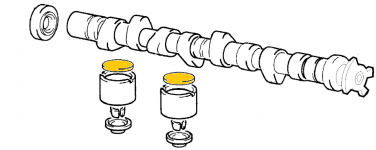Hi everyone,
Don't tappet plates suffer more friction than the tappets themselves?
As far as I understand, the plates take in all the friction between the tappet (the solid one, not hydraulic - for what matters) and the camshaft.
I'm questioning this just because not many people mention plates when replacing tappets.
P.S: I'm referring to the orange plate from the attached snapshot.
Thanks so much in advance.
Don't tappet plates suffer more friction than the tappets themselves?
As far as I understand, the plates take in all the friction between the tappet (the solid one, not hydraulic - for what matters) and the camshaft.
I'm questioning this just because not many people mention plates when replacing tappets.
P.S: I'm referring to the orange plate from the attached snapshot.
Thanks so much in advance.
Attachments
Last edited:


